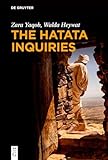The Hatata Inquiries : Two Texts of Seventeenth-Century African Philosophy from Ethiopia about Reason, the Creator, and Our Ethical Responsibilities / Zara Yaqob, Walda Heywat; ed. by Ralph Lee, Mehari Worku, Wendy Laura Belcher.
Material type: TextPublisher: Berlin ; Boston : De Gruyter, [2023]Copyright date: ©2024Description: 1 online resource (XXVII, 207 p.)Content type:
TextPublisher: Berlin ; Boston : De Gruyter, [2023]Copyright date: ©2024Description: 1 online resource (XXVII, 207 p.)Content type: - 9783110781878
- 9783110781984
- 9783110781922
- 199.63 23
- B5409.Z3753 H38 2024
- online - DeGruyter
- Issued also in print.
| Item type | Current library | Call number | URL | Status | Notes | Barcode | |
|---|---|---|---|---|---|---|---|
 eBook
eBook
|
Biblioteca "Angelicum" Pont. Univ. S.Tommaso d'Aquino Nuvola online | online - DeGruyter (Browse shelf(Opens below)) | Online access | Not for loan (Accesso limitato) | Accesso per gli utenti autorizzati / Access for authorized users | (dgr)9783110781922 |
Frontmatter -- Contents -- Preface -- Maps and Figures -- Simplified Spellings of Geʿez Words -- Abbreviations -- Chronology of Events regarding the Hatata Inquiries -- Introduction to the Hatata Inquiries -- Manuscripts of the Texts -- The Authorship of the Hatata Inquiries -- Translation Principles -- Translation of the Hatata Zara Yaqob -- Translation of the Hatata Walda Heywat -- Appendix 1: Chart of Differences between Abb 215 and Abb 234 of Hatata Zara Yaqob -- Appendix 2: Scribal Intervention in Abb 215 and Abb 234 -- Contributors -- Bibliography -- Index
restricted access online access with authorization star
http://purl.org/coar/access_right/c_16ec
The Hatata Inquiries are two extraordinary texts of African philosophy composed in Ethiopia in the 1600s. Written in the ancient African language of Geʿez (Classical Ethiopic), these explorations of meaning and reason are deeply considered works of rhetoric. They advocate for women’s rights and rail against slavery. They offer ontological proofs for God and question biblical commands while delighting in the language of Psalms. They advise on right living. They put reason above belief, desire above asceticism, love above sectarianism, and the natural world above the human. They explore the nature of being as well as the nature of knowledge, the human, ethics, and the human relation with the divine. They are remarkable examples of something many assume doesn’t exist: early written African thought. This accessible English translation of the Hatata Inquiries, along with extensive footnotes documenting the cultural and historical context and the work’s many textual allusions, enables all to read it and scholars to teach with it. The Hatata Inquiries are essential to understanding the global history of philosophy, being among the early works of rational philosophy. The book includes a translation by Ralph Lee with Mehari Worku and Wendy Laura Belcher of the Hatata Zara Yaqob and the Hatata Walda Heywat. The appendices by Jeremy R. Brown provide information on the scribal interventions in and the differences between the manuscripts of the two Hatatas. The book also includes a map, chronology, summary of the translation principles, and a discussion of the authorship debate about the Hatata Inquiries.
Issued also in print.
Mode of access: Internet via World Wide Web.
In English.
Description based on online resource; title from PDF title page (publisher's Web site, viewed 06. Mrz 2024)


